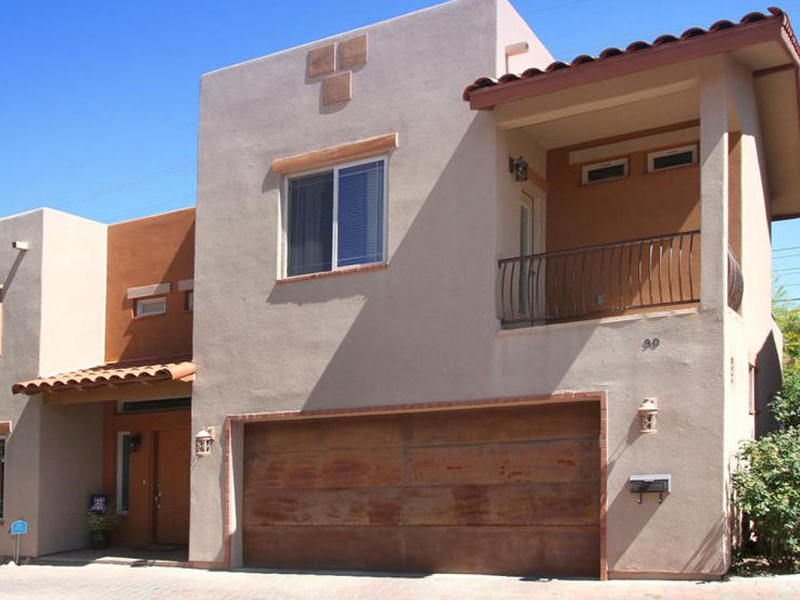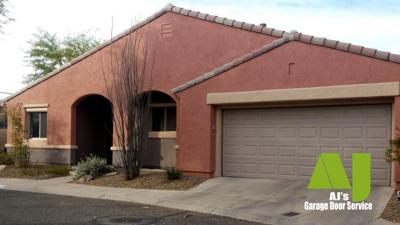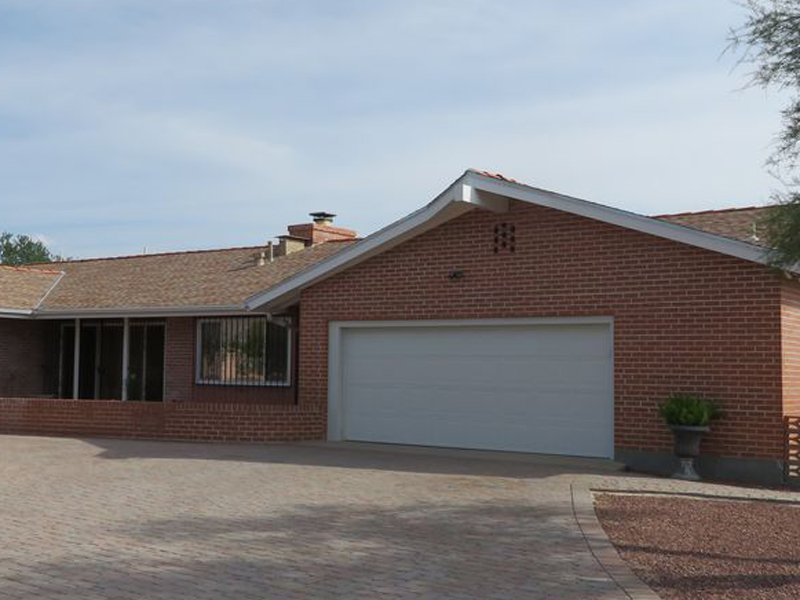Is Your Garage Door Stuck? Below's What to Do Very first
When your garage door will not open, begin with these necessary security checks before attempting any kind of repair work. First, make certain no person is standing near the door which vehicles are clear of the opening. Try to find apparent indications of damage like busted panels, bent tracks, or hanging cables. If you see a snapped spring or drastically damaged parts, quit immediately and call an expert—-- these fixings require customized tools and expertise to deal with safely.

Examine These 6 Points Prior To Calling a Specialist
Before presuming you need pricey repair services, run through this fast diagnostic checklist that solves most garage door troubles:
-
Source of power: Verify the opener is plugged in and the electrical outlet is functioning
-
Remote batteries: Change dead batteries in your remote
-
Hands-on lock: Check if somebody inadvertently involved the hand-operated lock
-
Blockages: Seek particles obstructing the door's course or sensing units
-
Emergency release: Ensure the red emergency situation cord hasn't been drawn
-
Circuit breaker: Validate the garage circuit hasn't stumbled
These simple checks solve roughly 70% of garage door problems without requiring professional intervention.
10 Usual Factors Your Garage Door Won't Open Up
Comprehending why your garage door opener isn't functioning aids you choose the best solution. Below are the most frequent reasons house owners experience:
Dead remote batteries represent the easiest fix—-- when batteries pass away, the remote can't send out signals to the opener. Power failures or stumbled breakers cut power to the electric motor. Busted springs prevent the door from raising effectively and call for instant specialist interest. Sensing unit imbalance causes security systems to obstruct door procedure. Track obstructions quit rollers from moving efficiently. Electric motor overload triggers automatic shutoffs when the opener detects resistance. Limitation switch issues confuse the opener about door position. Wire damage disrupts the training device. Weather-related issues impact door movement during extreme temperature levels. Part wear from age progressively lowers system performance.
Issue # 1: Dead Push-button Control Batteries
When your wall surface switch works however your remote doesn't, dead batteries are typically the perpetrator. A lot of garage door remotes make use of either 3-volt lithium or 12-volt alkaline batteries. Remove the back cover of your remote and check the battery kind. Change with fresh batteries and examine the remote. If it still does not function, you might need to reprogram it to your opener. Consult your opener's manual for certain reprogramming instructions, as the process varies by supplier.
Issue # 2: Power Supply Issues
Garage door power troubles often stem from loose connections or stumbled circuits. Examine that the opener is firmly connected into its electrical outlet—-- resonance can loosen connections gradually. Check the electrical outlet with another device to confirm it's functioning. Examine your home's breaker box for tripped circuits, particularly if you have actually experienced tornados or power fluctuations. GFCI outlets may have tripped and need resetting. If the opener has power yet will not react, the concern most likely lies in other places in the system.
Issue # 3: Broken or Damaged Springs
Damaged garage door springtimes are among the most dangerous elements to take care of. If you hear a loud bang from your garage or notice the door feels incredibly heavy when trying to raise by hand, a spring has most likely broken. Torsion springtimes run flat above the door, while expansion springs sit on either side. Never ever try springtime repairs yourself—-- these parts save significant tension that can cause severe injury or fatality. Expert replacement typically sets you back $150-$300 however guarantees your safety.
Problem # 4: Obstructed Safety Sensing Units
Modern garage doors include safety and security sensors that protect against closure when objects are found. These sensors can quit the door from opening up if they're unclean, misaligned, or obstructed by particles. Tidy sensing unit lenses with a soft fabric and ensure absolutely nothing blocks the invisible beam in between them. Check that sensors are properly lined up—-- a lot of have indication lights that show connection status. Sensor problems frequently resolve with easy cleansing and adjustment.
Issue # 5: Track Obstructions or Damage
Garage door tracks guide rollers as the door moves up and down. Dirt, particles, old grease, or little objects can jam the system. Check tracks visually and remove any type of blockages with a brush or fabric. Seek damages, flexes, or warping that might restrain smooth operation. Small track adjustments are possible for useful house owners, yet significant damage requires specialist fixing to avoid additional issues or security hazards.
Problem # 6: Garage Door Opener Motor Issues
When the garage door motor runs but the door doesn't move, numerous issues could be responsible. The motor may be overwhelmed and shutting down as a safety measure. Gear wear, particularly in older systems, can protect against correct procedure. Chain or belt drive issues influence power transmission. If you listen to unusual grinding, clicking, or humming sounds, stop making use of the opener quickly. Motor repairs frequently cost more than substitute, particularly for units over one decade old.
Step-by-Step DIY Troubleshooting Overview
Follow this organized method to garage door fixing while focusing on safety and security throughout the procedure:
Action 1: Check the wall button first. If it works however the remote does not, focus on remote issues. If neither works, inspect power supply.
Step 2: Examine the manual release cable. If it's been pulled, the opener is disengaged from the door. Press the trolley back to reconnect.
Action 3: By hand test the door by disengaging the opener and attempting to raise the door by hand. It should relocate smoothly and stay in area when half-open.
Step 4: Evaluate visible elements for damage, paying unique attention to springs, wires, and tracks.
Step 5: Inspect all safety features including sensing units, restriction buttons, and auto-reverse functions.
Step 6: Examination different controls (remote, wall surface button, keypad) to separate the trouble source.
Always use shatterproof glass and job gloves when executing examinations, and never effort repair services on springtimes or high-tension components.
When to Call a Professional vs. do it yourself Solutions

Knowing when to call a garage door professional versus attempting DIY fixings protects both your safety and security and your wallet. Take care of these concerns on your own: dead remote batteries, power supply troubles, minor track cleansing, sensor cleansing and alignment, and fundamental lubrication.
Never ever try these fixings yourself: spring substitute or change, cord repairs, major track adjustment, electrical circuitry issues, opener electric motor replacement, or any kind of repair involving high-tension parts. Professional professionals have actually specialized devices, training, and insurance policy to take care of unsafe repairs safely.
Take into consideration repair expenses versus substitute costs, especially for doors over 15 years old. Modern garage doors provide better safety and security features, energy efficiency, and reliability than older versions.
Emergency Garage Door Solutions
When you're stuck with a garage door that will not open and need instant accessibility, comply with these emergency treatments:
Guidebook Procedure: Draw the red emergency release cord to disengage the opener. This allows manual procedure yet needs appropriate strategy to prevent injury. Lift the door gradually and equally, making use of leg muscular tissues rather than your back. A lot of household doors evaluate 100-150 pounds, making them workable for a lot of adults.
Short-term Solutions: If the door opens up by hand but will not keep up, prop it open with sawhorses or clamps—-- never ever use your body or cars as supports. For doors that won't shut completely, make certain the opening is protected if you have to leave.
Emergency Solution: Numerous garage door business use 24/7 emergency solution for situations involving protection problems, trapped vehicles, or total system failures. While extra pricey than normal solution calls, emergency repair work give instant options when needed most.
Safety Warning: What NOT to Do
Garage door safety calls for understanding hazardous repair services that must never be attempted by property owners:
Never try to repair springs—-- they keep sufficient power to cause deadly injuries when they break or are poorly managed. Do not compel a stuck door—-- this can damage the opener, tracks, or door panels, creating extra pricey issues. Prevent bypassing security attributes—-- sensing units and auto-reverse devices stop serious injuries and residential property damage.
Don't neglect unusual sounds—-- grinding, scratching, or banging noises show issues that worsen with time. Never ever use the door if cords are frayed or broken—-- the door can drop unexpectedly. Do not try electric repair work unless you're a certified electrical expert—-- garage door openers make use of both 120V home existing and low-voltage control circuits.

Preventative Maintenance to Stay Clear Of Future Troubles
Routine garage door maintenance avoids most typical issues and expands system life expectancy significantly:
Monthly Tasks: Aesthetic assessment of all components, checking auto-reverse safety functions, checking and tightening up hardware, and cleansing tracks and sensors.
Quarterly Jobs: Lubricating all relocating parts with suitable garage door lubricant, screening handbook operation, and inspecting climate securing.
Annual Tasks: Specialist evaluation and tune-up, springtime adjustment if needed, and opener maintenance consisting of belt or chain change.
Seasonal Jobs: Planning for weather condition extremes, inspecting insulation, and changing opener settings for temperature changes.
Regular maintenance prices much less than emergency fixings and makes sure trustworthy operation year-round.
Garage Door Will Not Open Frequently Asked Questions
Why won't my garage door open with the remote yet works with the wall button?
This typically indicates dead remote batteries, signal disturbance, or the need to reprogram the remote. Check batteries initially, after that consult your opener guidebook for reprogramming instructions.
Can I manually open my garage door if the power is out?
Yes, draw the red emergency launch cord to disengage the opener, then raise the door by hand. Be prepared for the door's complete weight and lift with proper strategy to prevent injury.
Just how do I know if my garage door springtime is broken?
Signs include a loud bang from the garage, the door sensation very hefty when lifting manually, noticeable gaps in the springtime coils, or the door only opening a couple of inches prior to stopping.
Is it safe to use my garage door if it won't open all the way?
No, partial operation shows mechanical troubles that could aggravate suddenly. Stop using the door and have it inspected by a specialist to prevent further damages or injury.
What should I do if my garage door opens up but won't close?
Examine safety and security sensing units for obstructions or imbalance, check out the tracks for particles, and check the auto-reverse function. If these do not resolve the problem, get in touch with a professional.
How much does it set you back to take care of a garage door that won't open up?
Costs vary extensively depending upon the trouble: battery substitute ($5-$10), professional diagnosis ($50-$100), spring substitute ($150-$300), or opener substitute ($200-$500).
Can weather influence my garage door's capacity to open up?
Yes, extreme cold can enlarge lubricating substances and affect steel components, while warm can cause growth problems. Many issues deal with as temperatures normalize, however persistent concerns may need specialist focus.
Why does my garage door open up a few inches then quit?
This usually suggests busted springtimes, limit switch issues, or track blockages. The opener's security functions stop procedure when resistance is discovered, preventing damages to the motor or door.
Get Professional Help for Facility Problems
When DIY troubleshooting does not settle your garage door troubles, specialist specialists offer the knowledge and devices needed for risk-free, long-term repair work. Qualified specialists detect issues properly, make use of manufacturer-approved components, and give service warranties on their work.
Specialist solutions include: thorough system examinations, spring and cable television substitute, opener fixing and substitute, track alignment and substitute, electrical troubleshooting, and emergency service telephone calls.
What to expect: in advance prices, accredited and insured technicians, same-day solution for numerous fixings, and follow-up maintenance referrals.
A lot of garage door business offer cost-free estimates for significant repairs and can offer prompt options for immediate problems influencing home safety and security or car access.
Getting Your Garage Door Working Again
A garage door that won't open up does not need to ruin your day or damage your budget plan. Start with basic troubleshooting steps like inspecting power, changing batteries, and taking a look at for obvious obstructions. Several problems have quick do it yourself remedies that recover typical operation within minutes.
Nonetheless, identify when expert assistance is necessary—-- specifically for spring-related issues, electrical troubles, or facility mechanical failings. Attempting unsafe repair work yourself risks significant injury and commonly produces more expensive issues.
Regular maintenance protects against most garage door concerns and makes certain dependable procedure for many years to find. When issues do occur, address them immediately to stay clear of more costly repair services and keep your home's protection and convenience. Whether you need a simple battery substitute or complete system overhaul, options exist to obtain your garage door working smoothly once what to expect from a professional garage door service more.
Eddie's Garage Door Service
5505 N La Canada Dr, Tucson, AZ 85704
(520) 965-8259
www.EddiesGarageDoorService.com